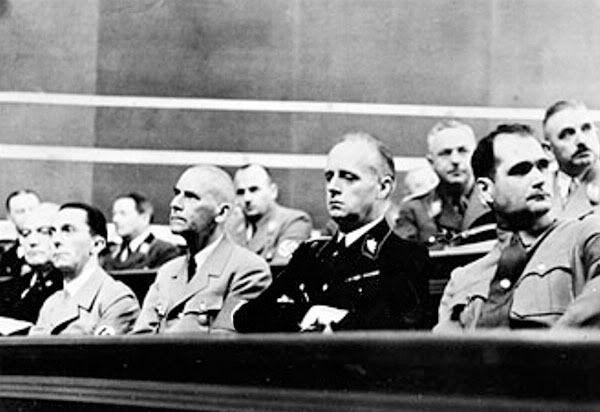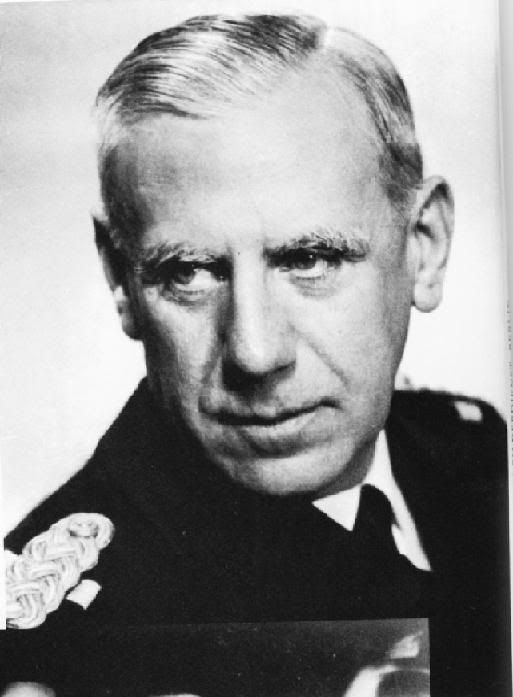Chapter I: Part XII
Chapter I: The Hammerblow
Part XII
January 16, 1936
The marble floors of the Reichschancellery resounded under the footsteps of the Führer’s entourage as it slowly wound its way to the State Chamber. The Führer was in a good mood, it seemed to those with him, chatting amiably with his aides and adjutants. Christoph Scholl walked with the entourage, taking in the stately architecture of the Bismarck-era building. There was talk amongst the staff that construction would soon begin for a new Chancellery -- on a far grander scale than the old.
Scholl had again been called to serve as Military Adjutant to the Führer, as Friedrich Hossbach remained unwell. The Führer had convoked a Special Court to try the fallen General Staff chief, Ludwig Beck. He had hand-picked the panel that would hear the case -- not a trained jurist was amongst them. Perhaps this was well, von Fritsch had said, because it spared Beck the wrath of the Volksgerichtshof -- the People’s Court -- and its demonic new president Roland Freisler.
The Special Court was to be headed by War Minister von Blomberg. von Blomberg would be joined by Generals Göring and von Rundstedt and Admiral Erich Raeder on behalf of the Armed Forces. Reichsführer-SS Heinrich Himmler, Franconia Gauleiter Julius Streicher and ideologue-at-large Alfred Rosenberg would sit on the court on behalf of the State and Party. It was to be a court of honor and inquiry rather than law, and by decree of the Führer, witnesses or evidence would not be brought to bear for either side.
Just before reaching the threshold, the Führer detached from his entourage to wait in his private room behind the chamber. An SS honor guard stood at the doors to the State Chamber. The great doors were soon opened, and Scholl and the others took their seats. It was a large room, but only the first few rows of seats were filled, as the trial was only to be observed by a select group of party functionaries, military officers and cabinet members.
Those attending the Special Court trial of General Beck. Rudolf Hess (front right) sulked through the proceedings at not having been appointed to the Court.
Scholl saw that the panel of seven was already seated behind a long table. At a smaller table facing them sat a colonel whom Scholl had not seen before. Next to him was the empty wooden chair in which the defendant would sit during the trial.
In several minutes, an SS officer bounded into the chamber and whispered something to Field Marshal von Blomberg. von Blomberg nodded, and the officer scurried out of the room. With a great rumble, the doors were thrown upon as a second SS officer called forth General Ludwig Beck, and recited for the court the charges against him: “High treason against the German Nation, as well as high treason against the person of the Führer consisting in the failure to report his knowledge of a plot against the life of the Führer and his person.”
Beck, in his full dress uniform, was led down the aisle by two guards. He was not shackled. When he had reached his seat, one of the guards signaled to a comrade at the back of the chamber. This man opened a small door, and Adolf Hitler entered. As one, those present surged to their feet. “Heil!”
The Führer took a seat on the dais above and behind the panel. von Blomberg rose. “The Special Court has now convened. Does the accused understand the charges brought against him?” The two men were friends, and Scholl sensed the strain that this formality placed upon them.
Beck stood. “I do, Field Marshal.”
“How do you answer them?”
“My honor as an officer compels me to answer that I was aware of this plot.” A murmur raced through the chamber. When it had died down, von Blomberg continued.
“Oberst Weiden has been appointed by the Special Court to see to your defense. Do you wish to let him speak on your behalf?”
“I will speak on my own behalf, Field Marshal.” From the looks of it, Scholl saw, Beck had never before laid eyes upon his attorney -- who upon hearing this immediately seemed to lose all interest in the case.
“Do you,” von Blomberg began, but was nudged by Streicher. The two conferred silently for a moment. “Do you recall being contacted by the organization known as the Reinickendorf Circle?”
“Yes, Field Marshal. But I only learned of it by that name after I was arrested.”
Streicher leapt to his feet. “Do you mean to tell the us, Herr Beck, that you were unaware of the group’s name?”
Beck smarted at Streicher’s sneering tone, but addressed his calm reply to the War Minister. “Field Marshal, I was unaware of the group’s name.”
Streicher was furious. “Do not lie to this court and your Führer! Tell us whether you knew the name!”
Beck looked at von Blomberg throughout his reply. “No. I did not know the name, Field Marshal.”
von Rundstedt and Raeder looked pleased at Streicher’s discomfiture. Himmler eyed Beck with distate. Rosenberg scribbled notes. Göring fiddled with the buttons of his uniform.
Streicher drew himself up to badger his prey a third time, but von Rundstedt shot to his feet and intervened. “General Beck, what did you do after learning of this plot?”
Beck paused before answering. “I replied that I had no interest in acting against the Führer, General.”
Before von Rundstedt could continue, Streicher was upon Beck again. “Then why, Herr Beck, did you not report this information?”
Again Beck hesitated. “I did not reply because I did not believe that the plotters could act against the Führer. When they contacted me, they asked the Army’s help in staging a putsch. I was never aware of the plot that they went on to carry out… Field Marshal.”
von Blomberg nodded his satisfaction, but Streicher bristled. Next, Rosenberg rose to ask a question of the defendant. “Given the gravity of your crime against the Reich and Führer, what sentence do you think is fitting for yourself?”
There was a lengthy pause. The other members of the Special Court were clearly much taken aback by this question. Scholl saw Goebbels in the front row, leaning to Interior Minister Frick and whispering what seemed to be a snide remark. At length, Beck spoke, clearly and proudly: “I am aware that I have acted wrongly in this matter. At the same time, I give my word of honor that I intended no harm to come to the Führer through my silence, nor did I harbor treasonous thoughts against Führer or Nation. I will resign as Chief of the General Staff, and from the Army as well if the Führer himself so wishes.” With that, he sat down.
The chamber instantly burst into chatter. Rosenberg still stood standing, seemingly unsure of what to do next. von Blomberg called for silence. When the chamber was again attentive, he turned to his colleagues on the Special Court. “Will you accept the sentence proposed by General Beck?” He pointed to each man in turn. “General Göring?”
The Luftwaffe chief had been adjusting his medals. “No, I do not.”
“General von Rundstedt?”
“I do.”
“Admiral Raeder?”
“I do.”
“Herr Streicher?”
The Gauleiter fumed. “No!”
“Reichsführer Himmler?”
The SS head deliberated for a moment. “No, I do not.”
“Herr Rosenberg?”
“I believe that General Beck has answered honorably today. If the sentence is satisfactory to the Führer, it is satisfactory to me.”
von Blomberg tallied the results. “Three to three. As president of the Special Court, I agree to the sentence suggested by General Beck.”
Scholl saw Hitler nodding approval from the dais. He stepped down, and quickly shook the hand of a stunned Beck. Without another word, he slipped out of the chamber.
At this, the members of the court rose to their feet, some shouting openly at Rosenberg. Reaction in the chamber clearly fell sharply along political lines. The officers, with the exception of Göring, unanimously rose to their feet in salute of Beck. The Party officials and nonmilitary functionaries were uniformly outraged. Scholl himself felt little pathos one way or the other. One point could not escape his notice, however: the Officer Corps had closed ranks around its own.


